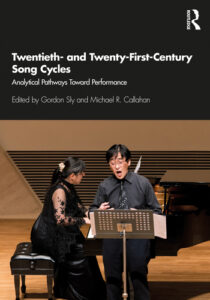
In addition to the editing and contributions of Michael Callahan and Gordon Sly, this new publication also contains chapters written by MSU music theory faculty Cara Stroud and James Sullivan.
Released in late 2020, Twentieth- and Twenty-
Released in late 2020, Twentieth- and Twenty-First-Century Song Cycles: Analytical Pathways Toward Performance (Routledge) analyzes 14 song cycles through a collection of individual essays by professional theorists and musicologists. The book captures the diversity of song cycle repertoire in contemporary classical music. Contributors examine works composed after the turn of the 20th century, including song cycles by Schoenberg, Britten, Poulenc, Shostakovich, Van Wyk, Sviridov, Wheeler and Sánchez.
Music Theory Area Chair Michael Callahan co-edited the collection with Gordon Sly, associate professor of Music Theory. Callahan, Sly, and MSU assistant professors of music theory Cara Stroudand James Sullivan are among the more than a dozen music theory scholars whose essays consider a work’s musical structure, selection of text, manner of expression for poetic narratives, and historic context.
Callahan remarked it was exciting that the work of MSU Music Theory faculty is so well-represented in the volume. He said the book was an outgrowth of a 2018 weekend conference on song cycles at MSU that consisted of 14 events by gifted performers, scholars and presenters from across North America

Michael Callahan, associate professor of Music Theory and chair of the Music Theory Area, created a conference with Gordon Sly that led to both editing and contributing to this new book.
“When you put a bunch of music theorists together, or a group of singers and pianists, the conversations often consist of specialized shop talk,” said Callahan. “But when these groups combine, like they did in the conference, the discussion broadens into something else entirely—a rich exploration of these pieces of music that is of equal interest to both scholars and performers, and that deals with topics that wouldn’t come up without the other present. That’s what I found most inspiring about the conference, and that’s what Gordon Sly and I aimed to do with the book.”
Sly said he and Callahan organized the conference and the book to harness the enthusiasm of the scholars, singers and musicians for the song-cycle artform. The goal, he said, is both to preserve and re-ignite interest in a form of expression and literature that has been largely overlooked.

MSU Associate Professor of Music Theory Gordon Sly is one of the editors and a contributor to this new publication.
“The conversation that led to this book began with the observation that the enormous achievements of the 20th century in the song cycle were, much like those of the string quartet, largely unrecognized because of iconic associations of those genres with earlier periods,” Sly said. “The overwhelming success of and response to the conference that engaged scholars and performers in such collaborative ways piqued our interest in preserving, in published form, work that spoke so meaningfully to a broad spectrum of musicians.”
Visit the publisher web site for more information and to purchase a copy of this book.




